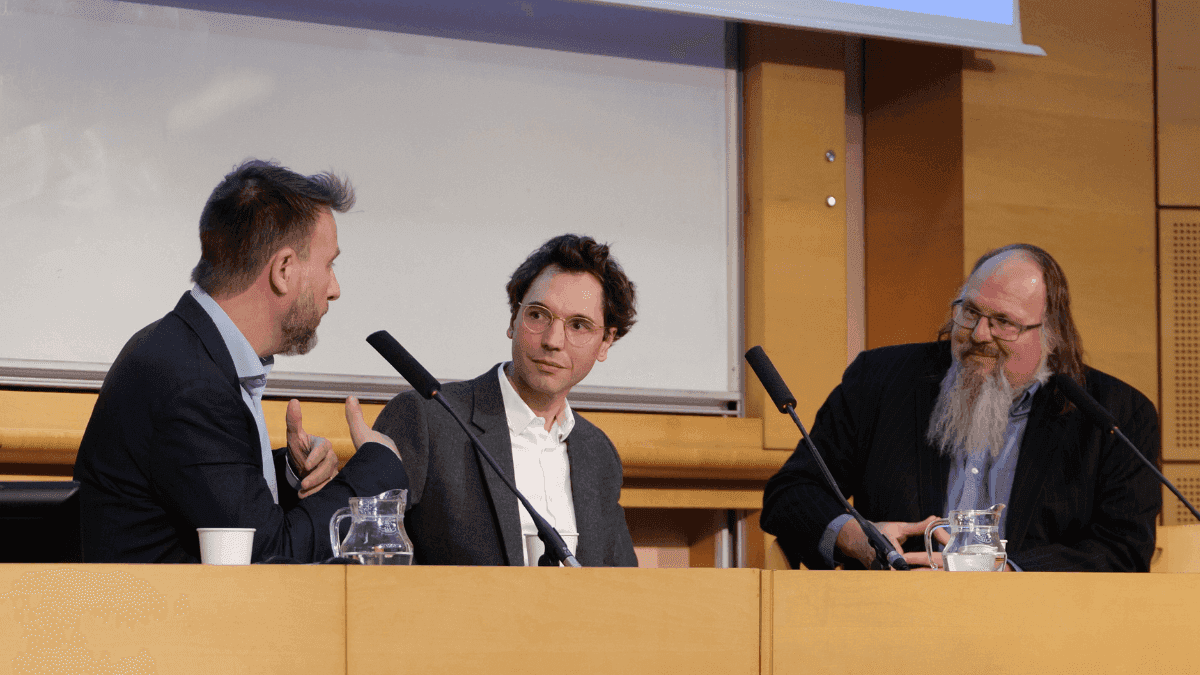Home>Launch of the Open Institute for Digital Transformations at Sciences Po

28.03.2024
Launch of the Open Institute for Digital Transformations at Sciences Po
From the invention of the Internet to the proliferation of algorithms driven by artificial intelligence, digital technology continues to disrupt and reshape the way we think, learn, work, get information, meet, create and communicate. It is a revolution that permeates everything we do, to the point of rocking the very foundations of our democracies.
In keeping with its mission to understand contemporary challenges in order to take action, Sciences Po has launched the Open Institute for Digital Transformations. By creating a permanent dialogue between the social sciences and humanities and other scientific disciplines, the Open Institute for Digital Transformations aims to become a unique space where the European vision of the impacts and uses of digital technology is conceived, developed and tested.
Check out the replay and 5 photos of the Institute’s launch event on 21 March.
Learn more in an interview with the Institute’s director, Jean-Philippe Cointet.
HOW WAS THE INSTITUTE’S NAME CHOSEN, AND WHY?
The Open Institute for Digital Transformations provides a new space to facilitate and coordinate research and teaching on a theme – digital transformations – that transcends traditional disciplinary boundaries. As a university-wide institute, it complements Sciences Po’s existing structure without supplanting our traditional centres, departments and schools.
The word “open” in the name reflects three key forms of openness that we value. First, the opening of the social sciences to other scientific disciplines: engineering and computer science of course, but also the natural sciences, which are major producers of data. One of the Institute’s core features is fostering interdisciplinary collaboration within the humanities and social sciences and beyond, through our partners in the TIERED project.
Second, the Institute aims to provide a new forum for discussion between Sciences Po and wider society. To do so, we intend to disseminate our research findings to a wider audience in new formats, help shape public debate on the issues and concerns raised by certain technologies, and participate in public policy discussions with and about digital technologies.
Third, we want to create the conditions for a balanced dialogue between our research university and society. That means establishing mechanisms through which different stakeholders can contribute to the definition of research questions and the construction of research protocols. We want to promote open and participatory science, which puts citizens and civil society at the heart of research questions.
WHAT ARE YOUR GOALS FOR THE INSTITUTE? WHAT CHALLENGES WILL IT FACE?
Our goal is to put Sciences Po on the map of leading international universities for envisioning, analysing and testing the relationship between digital technology and society. Two such places that immediately spring to mind are the Internet Oxford Institute in the UK and the Berkman Klein Center across the Atlantic.
We hope to establish strong ties with centres of excellence on all things digital in Europe and further afield to stimulate the Institute with new ideas. As a humanities and social sciences university, one of the main challenges we face is to make our singular voice heard in a highly saturated space where techno-determinist discourse on digital technology often dominates.
We must manage to highlight the importance of the social and cultural context in which technical objects are deployed, unpack these objects to reveal the moral and political principles on which they are based, and, where appropriate, help inject them with the foundational principles of our European democracies.
Another challenge stems from the transformation of the humanities and social sciences themselves with the advent of digital methods (machine learning in particular) and the increasing digitisation of our societies. These new tools and data allow us to capture and describe social phenomena in unprecedented ways. Sciences Po has a key role to play in the development of computational social sciences to ensure that these tools, which often come from the worlds of computing and mathematics, are compatible with the epistemology of the humanities and social sciences.
IN WHAT WAY IS IT SCIENCES PO’S ROLE TO BRING A EUROPEAN VOICE TO BEAR ON DIGITAL ISSUES?
As an international research university in the humanities and social sciences, with recognised expertise in governance and societal transitions, Sciences Po aims to become a leader in understanding and harnessing digital technologies. This objective aligns perfectly with Sciences Po’s motto, “understand our times, make a difference”. We’re looking to analyse the use of technologies and understand their impact in order to give our students, policymakers, business leaders and the general public the tools to actively support these transformations.
Sciences Po adopted an interdisciplinary approach to the digital world nearly 15 years ago with the creation in 2009 of the médialab, a unique interdisciplinary laboratory bringing together sociologists, designers and developers under the leadership of Bruno Latour. Now, we have researchers working on digital topics and using digital methods in all of Sciences Po's research centers. As a university at the intersection of research, teaching and public policy, it is our responsibility to work with students, researchers, the general public and decision-makers to ensure that technology serves to develop data-driven policies, strategies and innovations.
With the DSA (Digital Services Act) and the DMA (Digital Markets Act) having just come into force, and the AI Act having just been adopted by the European Council and Parliament, we are at a pivotal moment for attesting to the impact that a European vision can have on digital platforms. By bringing together research on law, public policy and technology, the Open Institute for Digital Transformations is in a prime position to describe the disturbances that online environments generate and decipher their mechanisms, but also to contribute to alternative forms of governance and technological solutions that work in the public interest.





